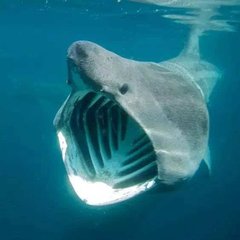About ten years ago before we began production of Jonathan Bird's Blue World
大约在十年前,我们开始制作“乔纳森·伯德的蓝色世界”以前,
I was up in the Bay of Fundy, Canada, photographing Basking Sharks, which are the second largest fish on earth.
我在加拿大芬迪湾拍摄姥鲨,它们是地球上第二大的鱼。
I noticed that all the sharks had these long slimy, skinny fish stuck to their skin.
我注意到所有的鲨鱼皮上都粘着这些又长又细的鱼。
I didn't know what they were, so I plucked one off the skin of the shark;
我不知道它们是什么,所以就从鲨鱼皮上拔了一条;
took it back to the boat and took some pictures of its face.
并把它带回船上,拍了一些它的面部照片。
I figured out that it was a parasitic Lamprey.
我想到它是一种寄生的七鳃鳗。
I didn't really think much of it and so I threw it back in the water, and went home with my pictures.
我并没有想太多,于是就把它扔回水里,带着我的照片回家了。
A few months later I got a phone call from Dr. Steve Turnbull,
几个月后我接到了史蒂夫·特恩布尔博士的电话,
a Marine Biologist at the University of New Brunswick,
他是新布伦瑞克大学的海洋生物学家,
and he wanted to talk to me about this. He heard about it from the fishermen.
他想和我谈谈这件事,他从渔民那里听说了它。
Turns out that I had made a new discovery.
原来我有了一个新发现。
Shark biologists did not think that lampreys could live on sharks.
鲨鱼生物学家认为七鳃鳗不能靠鲨鱼生存。
So the following summer we took the research boat from the University of New Brunswick
于是,第二年夏天,我们乘坐新布伦瑞克大学的研究船
back to the Bay of Fundy on an expedition to investigate.
回到芬迪湾进行考察。
Hi, I'm Jonathan Bird and welcome to my world!
嗨,我是乔纳森·伯德,欢迎来到我的世界!
It's a beautiful summer morning in Atlantic Canada.
这是大西洋省美丽的夏日清晨。
As the sun rises at 5 AM, the fog blows off the water and I head down to the dock to meet my ride.
当太阳在凌晨5点升起时,雾从水面退去,我走到码头迎接短期之旅。
We begin loading the "Mary O", a research boat from the University of New Brunswick.
我们开始装载“玛丽·奥”,它是一艘新布伦瑞克大学的研究船。
Shark biologist Steve Turnbull is aboard,
鲨鱼生物学家史蒂夫·特恩布尔在船上,
hoping to gather first-hand proof that Basking sharks in the Bay of Fundy have lampreys on them.
他希望能收集到芬迪湾的鲨鱼身上有七鳃鳗的第一手证据。
Also aboard is lamprey biologist Dr. Mike Wilke,
船上还有一名名叫迈克·威尔克的七鳃鳗生物学家,
who has brought all kinds of scientific equipment to test the lampreys..., assuming we find any.
他带来了各种各样的科学设备来测试七鳃鳗,假设我们能找到的话。
We're heading out into the middle of the Bay of Fundy, a long stretch of water between mainland Canada and Nova Scotia.
我们正前往芬迪湾中部,它是加拿大大陆和新斯科舍省之间的一段狭长水域。
It has the highest tides in the world and a huge amount of plankton.
它有世界上最高的潮汐和大量的浮游生物。
Plankton is food for many animals in the ocean.
浮游生物是海洋中许多动物的食物。
The word plankton means drifter, so anything drifting is planktonic.
“plankton”一词的意思是“漂流物”,所以任何漂泊的东西都是浮游的。
These tiny copepods are planktonic crustaceans, smaller than a grain of rice.
这些小桡足动物是浮游甲壳类动物,它们比一个米粒还小。
More than a quarter of million of them could fit into a coffee cup.
25万多只小桡足动物可以装进一个咖啡杯里。
They might not seem like much...
它们可能看起来并不多……
But they are the main food source for the Basking shark,
但它们是姥鲨的主要食物来源,
which swims through the water with its mouth wide open to filter them out of the water by the millions.
姥鲨张着大嘴穿过水流,能过滤出数百万只小桡足动物。
Basking sharks are the second largest fish on Earth, reaching 45 feet long.
姥鲨是地球上第二大鱼类,长达45英尺。
That makes them longer than a school bus! That is one big shark!
它们比校车还长!是条大鲨鱼!
But since they feed only on plankton, they are no threat to people at all.
但由于它们只吃浮游生物,所以对人类没有一点儿威胁。

In fact, a Basking shark's throat is only the size of a grapefruit.
事实上,姥鲨的喉咙只有葡萄柚那么大。
It can't swallow anything bigger than that!
它不能吞下比这更大的东西!
With the boat finally loaded with all our gear, we push off the dock and head out towards the sharks.
我们的船终于满载着我们所有的装备离开码头,向鲨鱼驶去了。
Passing the beautiful shoreline of Atlantic Canada reminds me that
经过大西洋省美丽的海岸线时,我想到
this is one of the most serene and peaceful places on Earth, even if the water is a bit cold.
它是地球上最宁静祥和的地方之一,即使水有点儿冷。
Our travels take us past the lighthouse on Grand Manan Island,
我们经过大马南岛的灯塔,
and finally out into the open water of the Bay of Fundy.
最终来到芬迪湾的开放水域。
We are soon joined by a pod of Atlantic white-sided dolphins, riding in our bow wave.
很快一群大西洋白侧海豚加入了我们,它们正坐在我们的船头波上。
Dolphins are always fun and add to the enjoyment of being at sea.
海豚总是很有趣,它们增加了我们在海上的乐趣。
Further out, we find whales.
在更远的地方,我们发现了鲸鱼。
These are not just any whales, but Northern Right whales, the most endangered whales on Earth.
这些不是普通的鲸鱼,而是北脊美鲸,它们是地球上最濒危的鲸鱼。
There are only 300 of them left in existence.
现存的只有300头。
Finding them is a good sign because they eat the same copepods that Basking sharks eat.
找到它们是个好兆头,因为它们吃得桡足动物和姥鲨吃的一样。
If the whales are here, the sharks probably are too.
如果鲸鱼在这里,鲨鱼可能也在这里。
We all grab binoculars and start scanning the horizon.
我们都拿着双筒望远镜,开始扫视地平线。
Basking sharks get their name because they often come to the surface to feed when it's really calm.
姥鲨得此名是因为它们经常在海面平静时到上面来觅食。
Sailors used to think they were basking in the sun and that's how they got their name.
水手们过去常常以为它们在晒太阳,它们的名字由此而来。
We see something on the horizon and start heading that way.
我们在地平线上看到了一些东西,并开始朝那个方向前进。
Soon we get closer and the shark dives out of site.
很快,我们走近了,鲨鱼潜水离开了原地。
Back to the binoculars.
我们又拿起双筒望远镜。
Basking sharks are big fish and they don't need to come to the surface to breathe like whales.
姥鲨是一种大鱼,它们不需要像鲸鱼一样到海面上呼吸。
So you have to get really lucky to find one close enough to the surface that its dorsal fin sticks out of the water.
所以你必须非常幸运地找到一条离水面够近、背鳍伸出水面的鲸鱼。
Without that, we have no hope of finding any.
否则,我们没有希望找到一条。


